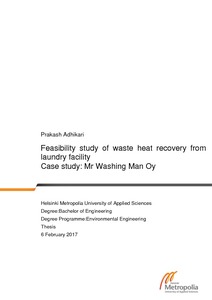Feasibility study of waste heat recovery from laundry facility : Case study: Mr Washing Man Oy
Adhikari, Prakash (2017)
Adhikari, Prakash
Metropolia Ammattikorkeakoulu
2017
All rights reserved
Julkaisun pysyvä osoite on
https://urn.fi/URN:NBN:fi:amk-201702092213
https://urn.fi/URN:NBN:fi:amk-201702092213
Tiivistelmä
The purpose of this thesis was to study the feasibility of waste heat recovery from laundry facility of a company Mr Washing Man Oy. The usefulness of heat recovery was deter-mined from wastewater leaving the washing machine at 60oC and 0.11 kg/s and hot air exiting from dryer at a temperature of 90oC and at a flow rate of 1.5 kg/s. Thesis project focused on the description of system, calculation of the energy savings, case studies of heat exchangers suitable for waste heat recovery system and pinch analysis of the system. Distance between recovery system and consumer, compatibility, accessibility, quality of heat source, upgrading requirement, flow rate and legislation were also studied for feasibility considerations.
The result of the thesis project suggests that a significant amount energy available in waste water and dryer exhaust air that can be harnessed, and this would save approximately €40,000 per year. Extracting 650 MWh of energy per year is a compelling benefit for climate and environment as well. In terms of maintaining minimum distance between recovery system and consumer, accessibility and legislation, the heat recovery is feasible with some necessity for further considerations in flow rate, quality of heat and compatibility be-cause of their correlations.
Experimental observations within the process for parameters such as temperature, mass flow could lead to more reliable and accurate energy output and savings. For further re-search, study of heat pump in series in colder exhaust from heat exchanger to heat the water further is recommended. This integration of heat pump and heat exchanger might harness higher overall energy from the process compare than an individual system.
The result of the thesis project suggests that a significant amount energy available in waste water and dryer exhaust air that can be harnessed, and this would save approximately €40,000 per year. Extracting 650 MWh of energy per year is a compelling benefit for climate and environment as well. In terms of maintaining minimum distance between recovery system and consumer, accessibility and legislation, the heat recovery is feasible with some necessity for further considerations in flow rate, quality of heat and compatibility be-cause of their correlations.
Experimental observations within the process for parameters such as temperature, mass flow could lead to more reliable and accurate energy output and savings. For further re-search, study of heat pump in series in colder exhaust from heat exchanger to heat the water further is recommended. This integration of heat pump and heat exchanger might harness higher overall energy from the process compare than an individual system.
